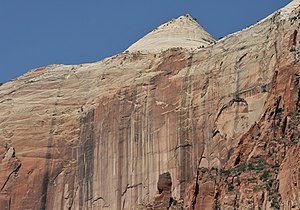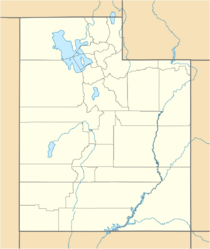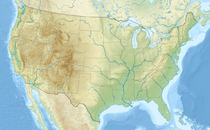Earth:Bee Hive (Peak)
| Bee Hive Peak | |
|---|---|
| Bee Hive | |
 Bee Hive Peak and The Streaked Wall | |
| Highest point | |
| Elevation | 6,904 ft (2,104 m) [1]> |
| Prominence | 224 ft (68 m) [1] |
| Isolation | 0.47 mi (0.76 km) [1] |
| Coordinates | [ ⚑ ] : 37°13′28″N 112°59′15″W / 37.2244897°N 112.9874313°W [2] |
| Geography | |
| Location | Zion National Park Washington County, Utah United States |
| Parent range | Colorado Plateau |
| Topo map | USGS Springdale East |
| Geology | |
| Type of rock | Navajo sandstone |
| Climbing | |
| Easiest route | class 5.7 Climbing[1] |
Bee Hive is a 6,904-ft elevation summit composed of Navajo Sandstone located in Zion National Park in Washington County of southwest Utah, United States .[2] Bee Hive is located north of the park headquarters at the south entrance to Zion Canyon. The east face of Bee Hive, named The Streaked Wall, rises 2,900 feet (880 m) above the floor of Zion Canyon. Neighbors include Altar of Sacrifice and Meridian Tower to the west, and The Sentinel to the northeast. The peak's descriptive name is for the beehive shape of the summit. This name was officially adopted in 1934 by the U.S. Board on Geographic Names.[2] Precipitation runoff from the mountain drains into the North Fork Virgin River.
Climate
Spring and fall are the most favorable seasons to see Bee Hive Peak. According to the Köppen climate classification system, it is located in a Cold semi-arid climate zone, which is defined by the coldest month having an average mean temperature below 32 °F (0 °C), and at least 50% of the total annual precipitation being received during the spring and summer. This desert climate receives less than 10 inches (250 millimeters) of annual rainfall, and snowfall is generally light during the winter.[3]
Climbing Regulations
A bivouac permit is required from the park visitor center for any climbs expected to last overnight.[4]
Gallery
See also
- Geology of the Zion and Kolob canyons area
- Colorado Plateau
References
- ↑ 1.0 1.1 1.2 1.3 "Bee Hive Peak - 6,904' UT". https://listsofjohn.com/peak/21340. Retrieved 2020-09-09.
- ↑ 2.0 2.1 2.2 U.S. Geological Survey Geographic Names Information System: Bee Hive
- ↑ "Zion National Park, Utah, USA - Monthly weather forecast and Climate data". Weather Atlas. https://www.weather-us.com/en/utah-usa/zion-national-park-climate.
- ↑ Climbing regulations. Zion National Park.
External links
- Zion National Park National Park Service
- Bee Hive: Weather forecast








